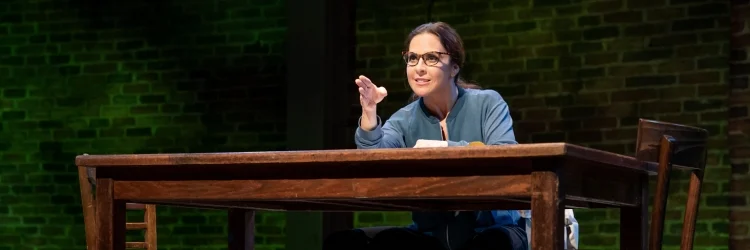Review of Audible's the way she spoke, starring Kate del Castillo, at Minetta Lane Theatre
It is is snowing in Juárez? It never snows in Juárez. Something is terribly wrong.
Women are disappearing from the streets of Juárez. Some have never been found. Others have been discovered in ditches and behind dumpsters. The fallout from drug trafficking and gang battles has been a descent into lawlessness that has left the women of Mexico uniquely vulnerable to an extraordinary level of violence. Women's bodies are literally the battlefield across which gang wars are raging. In Audible's the way she spoke, currently playing the Minetta Lane Theatre, Isaac Gomez has drawn from interviews with real women to expose just how terrifying life in Juárez has become. It is riveting theater.
Raised partly in El Paso and partly in Juárez, Gomez grew up with one foot in Texas and the other in Mexico. As he writes, "when you live in a border city you are everywhere." So too is this play, as is Kate del Castillo, as actress, playwright and the women of Juárez. Del Castillo gives a stunning performance as she weaves among the myriad veils of character, bringing them to life.
The production is impeccable; director Jo Bonney has left nothing to chance, even as she has given del Castillo freedom to move organically through the material. Not one moment is wasted, and the thread of energy is pulled taut but the momentum remains unforced.
Against the backdrop of Ricardo Hernandez's spare set design of exposed brick and simple furniture, Aaron Rhyne's visually arresting projections bring context swiftly to life - sketching the ghostly skyline of the town at night or highlighting rows of pink crosses or, most devastatingly, projecting photos of the missing women of Juárez. Lighting Designer Lap Chi Chu alternately bathes the stage in swaths of saturated color or clear white light, layering mood and clarity.
Towards the conclusion of the way she spoke, as snow falls delicately on the rows of pink crosses, the realization dawns on us simultaneously that in giving voice to these women, silenced by violence and lost to time, Gomez's script is a brilliant, tragic book of the dead.
It is snowing in Juárez. It never snows in Juárez. Something is terribly wrong.
(Photo by Joan Marcus)
WHAT THE OTHER CRITICS SAID
"Directed by Jo Bonney, the way she spoke is an aching, outraged work of vigil, protest and inquiry — albeit one whose human drama remains at a strange remove in this frustrating Audible Theater production."
Laura Collins-Hughes for New York Times
"Gomez's play picks its way carefully among genres: It's half memoir, half fiction, half documentary, half memorial. That's too many halves—there's too much play here. But that's because there is no appropriate response other than surfeit of anguish, of pity, of rage. Del Castillo begins to tremble with all three, so much so that her scripted self rebels. the way she spoke bows down with grief, and chooses not to get up again."
Helen Shaw for Time Out New York
"On the one hand, playwright Isaac Gomez presents a docudrama cataloging despicable acts of violence against women just across the Mexican border in Juarez, Mexico, based on his own interviews with the people there. On the other hand, that often moving, sometimes harrowing material is put into a meta framing device that is more distracting than revelatory."
Thom Geier for The Wrap
"Despite its important, difficult subject matter and its attempts to draw broader parallels to the treatment of women the world over, the work suffers from an odd detachment. The story's emotional core is short-circuited by the play's structure and the production's approach. Foregrounded but enervating theatricality rests uneasily against the documentary elements, and the voices of the real people who have suffered get lost in the dramatizing."
Nicole Serratore for Variety
Originally published on
